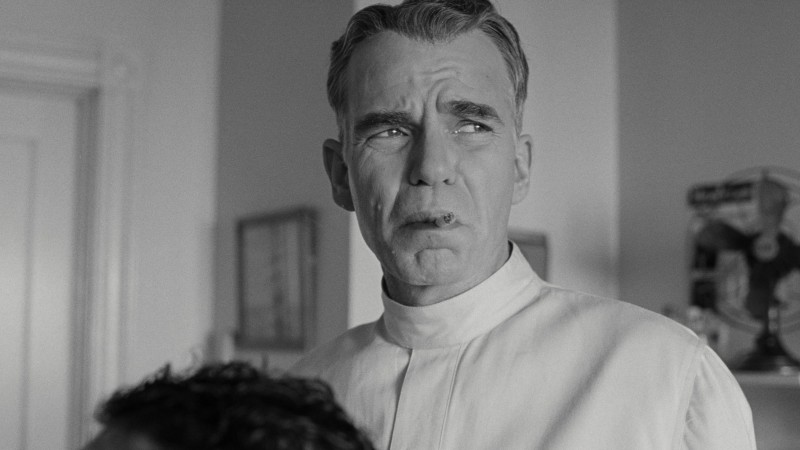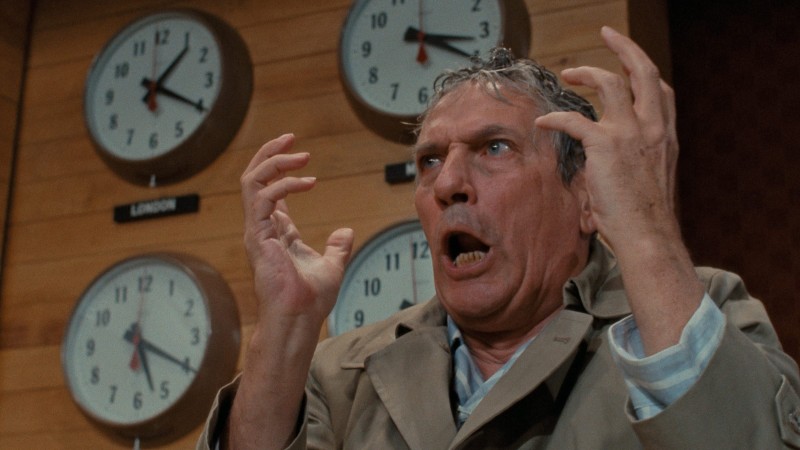The first episode is titled “Jochen and Marion,” and John and Schygulla have a chemistry that makes their pairing feel inevitable, even if Marion’s shrill colleague (Irm Hermann) and her mother (Brigitte Mira) disapprove of Marion dating “someone who gets his hands dirty at work.” Jochen spends his days at a factory “making machines that go in other machines”; Marion spends hers in the advertising department of the local newspaper. She loves to play verbal games, and he loves playing them with her. Their conversations lead them into a plainspoken Marxist materialism. Usually, Marion is Socrates. “Where does the company get its money from?” she asks Jochen at one point about his workplace. “From selling the stuff!” He laughs, as if the answer is obvious. “But where does it get the stuff it sells?” He blanks. “From you,” she persists, “because you made it!” Jochen will take this philosophy to the factory; after a nasty manager withholds a bonus that he promised, Jochen and his fellow workers begin to organize.
The titles of the subsequent episodes arrange the members of the cast in different pairs. Grandma and Gregor (Werner Finck), a quiet widower whom she picks up in a park, headline the second one, in which they move in together and start a progressive kindergarten. Franz (Wolfgang Schenck) and Ernst (Peter Gauhe), a worker who aspires to become a foreman and the foreman who helps him study for the exam he has to pass to do so, are at the center of the third. The fourth is named for Harald (Kurt Raabe) and Monika (Renate Roland), Jochen’s unhappily married sister and her sneering husband; the fifth, for Marion’s office mate Irmgard and Rolf (Rudolf Waldemar Brem), the coworker and friend of Jochen’s she ends up with. (Fun fact: when Fassbinder met Irm Hermann in 1965, she was working as a secretary; at the beginning of their affair, when he was still cajoling her into acting, he would pick her up at her office every night to take walks in Munich’s English Garden. “He talked about the movies he wanted to make,” Hermann later recalled. “That was my first step out of a bourgeois existence.”)
Eight Hours Don’t Make a Day does not lack for moments of conflict—or absurdity. Some of the early scenes in the Epp house approach slapstick, as family members jostle to use the single bathroom. The ad-placement office where Marion and Irmgard work occasions several surreal vignettes. A man whose wife has just died comes in to place an ad in search of forty hens, a cock, and a henhouse to contain them; he always wanted to raise chickens, and his nagging wife would not let him! In another, Grandma places an ad for another grandma for her son-in-law Wolf to bicker with. We see more sinister cruelties, too. One of the workers at the factory constantly hurls racial slurs at Giuseppe (Grigorios Karipidis), a migrant reminiscent of the character Fassbinder himself played in Katzelmacher (1969).
There are hints of subversive attractions among these men, when they shower together at the factory or go dancing—and of the violent response that such attractions might inspire—but only hints. By the end, the characters have found a solution to every major problem that confronted them. Work arrangements have been rearranged; tensions at home have given way to new forms of cohabitation and cooperation. As in a Shakespearean comedy, all the right couples have come together.
In addition to the priorities of the WDR drama department, Fassbinder’s successful “occupation of a bourgeois genre” reflects the lessons he drew from Douglas Sirk. Fassbinder began working on Eight Hours Don’t Make a Day a couple of years after his famous encounter with the films of the Danish-German director, who fled the Nazis with his Jewish wife and landed in Hollywood. The Technicolor melodramas that Sirk made for Universal Studios in the fifties helped inspire a watershed in Fassbinder’s career, one that took him from the jumpy, Godard-like deconstructions of Katzelmacher and Love Is Colder Than Death (1969) to his more mature work of the seventies, where melodrama serves as a vehicle for psychological insight and social criticism.








